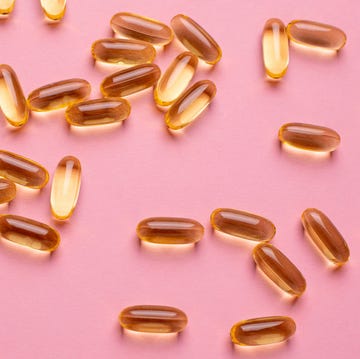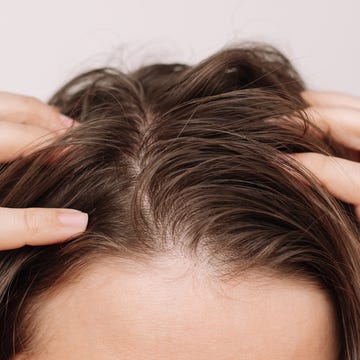Do you take your vitamins with your breakfast and coffee? If so, it might be time to switch up your routine. That's because certain vitamins, especially if you’re deficient in them, may not absorb as well if they interact with some of the components in coffee.
Research shows that coffee intake can increase vitamin D levels, while decreasing levels of zinc, calcium and vitamin B. And although coffee contains valuable polyphenol antioxidants like chlorogenic acid (CGA) that can help reduce your risk of heart disease, these same compounds could negatively affect absorption of certain vitamins and minerals.
The takeaway? Experts suggest capping your daily caffeine intake at 200 mg (about 2 cups of brewed coffee) to reap the most health benefits. And regardless of daily caffeine intake, avoid taking the vitamins and minerals below within an hour of drinking coffee.
Vitamins and minerals you shouldn't take with coffee
Iron
Drinking coffee at the same time that you take your iron supplement can greatly reduce iron absorption. In fact, a 2022 study from Switzerland showed that when iron deficient women took an iron supplement with coffee, iron absorption was decreased by 54% compared to taking it with water. The disruption of iron absorption stems from its interaction with the polyphenol and tannin antioxidants in coffee. The good news is that a 2020 study shows there was no decrease in iron absorption when coffee was consumed one or two hours before a meal.
Vitamin D
A 2021 study shows that higher intakes of caffeine were linked with lower levels of serum 25-hydroxyvitamin D [25(OH)D] — what's more commonly referred to as vitamin D. It is suggested that caffeine, like that found in coffee, may interfere with vitamin D absorption by reducing the expression of vitamin D receptors.
B Vitamins
The caffeine in coffee has a diuretic effect that can lead to increased excretion of water-soluble vitamins, including most B vitamins as well as vitamin C, before they are fully absorbed. On top of that, the polyphenols in coffee may also impact B vitamin absorption.
Calcium
Since vitamin D is important in the absorption and use of calcium in building bone, drinking coffee may indirectly reduce calcium absorption a bit when consuming at the same time as your supplement. This is especially true for those who may already have low calcium or vitamin D levels, or those who are at risk for osteoporosis, such as the older adult population.
How to consume coffee and vitamins
If you’re taking any vitamin or supplement on the list above, be sure to separate coffee consumption from your daily dosage of vitamins by at least an hour. But you may want to keep your morning coffee intact and instead change your supplement timing to later in the day.
“If possible, it’s best to eat breakfast first, or drink coffee with breakfast, so you’re not consuming coffee on an empty stomach which can irritate your stomach lining, says Shelley Balls, MDA, RDN, LDN, a registered dietitian and nutritionist for WOWMD. Then, wait an hour or two to take your supplements. “Limiting your intake of coffee to two cups per day can also help reduce nutrient absorption interference,” she adds.
Another option is to get a vitamin organizer and place the supplements that don't interact with coffee in the daytime compartments and those that do in the evening ones, when you are less likely to consume coffee.
What about tea?
Just like coffee, many types of tea also contain antioxidants and similar compounds found in coffee that may interfere with the absorption of certain vitamins and minerals. “Tea, especially black and green varieties, also contain tannins and caffeine, both of which can affect nutrient absorption," says Cheryl Mussatto MS, RD, LD, an Outpatient Clinical Dietitian at Cotton O'Neil Endocrinology and Diabetes Clinic in Topeka, Kansas. "While the impact may be slightly less than coffee depending on the type and amount, it’s still smart to avoid pairing tea with supplements like iron or calcium.”
Other ways to help absorb vitamins
Besides rescheduling your coffee consumption, there are other things you can do to optimize your vitamin and mineral absorption.
- Eat more nutrient-dense meals and snacks: Ensure your vitamin and mineral intake is enough by increasing your intake of nutrients like calcium and iron through meals and snacks. Calcium is found in milk and milk-based items like yogurt, and cheese as well as fortified plant-based milk and juice, while good sources of iron include meat, poultry, fish, seafood as well as plant-based foods like beans, lentils, nuts and seeds. Consuming vitamin C with your iron-rich meals may help boost its absorption.
- Stay hydrated: Since non-decaf coffee contains caffeine, which is a diuretic, it could contribute to fluid and mineral losses, especially to water-soluble vitamins like B vitamins and vitamin C. So, make sure you consume plenty of water and other low-calorie, decaffeinated drinks with each meal and snack.
- Visit your healthcare provider: If you’re worried your vitamin and mineral levels may be low, be sure to have your levels tested at least once a year. If you’re deficient in any vitamins and minerals, you can get a prescription for the necessary nutrients.
The bottom line
To make the most of your vitamin routine without skipping your morning coffee, it’s all about the timing. Check your supplement labels for those nutrients where coffee components are most likely to interfere, and take these vitamins at least one hour from the time of your cup of Joe. And if you’re still worried you’re not absorbing enough nutrients, simply add more nutrient-dense foods at meals and snacks and visit your doctor each year to test for your vitamin and mineral levels.
Rachel Lustgarten (she/her), M.S., R.D., C.D.N., is a registered dietitian in clinical practice in New York City. Her primary area of focus is medical nutrition therapy and weight control. Rachel’s passion is sharing her knowledge and expertise of food and nutrition’s role in overall health and wellness. She co-hosts the weekly “Primary Care Medicine” show on SiriusXM Doctor Radio, interviewing expert guests and fielding listener calls and questions about hot topics in health and nutrition. She served as a clinical dietitian at the Comprehensive Weight Control Center at Weill Cornell Medicine and served as an Advisor to the Weill Cornell’s Women’s Nutrition Connection monthly newsletter for 10 years. Rachel received a Master’s degree in Clinical Nutrition from New York University, graduating with honors.













